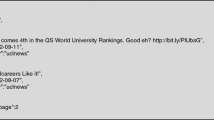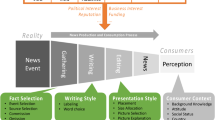Abstract
Nowadays, with the advancement of information technology and the growing importance of social media, social media platforms such as Twitter and Facebook have become deeply entrenched in our lives and are growing rapidly around the world. On these platforms, users have the freedom to share and publish whatever they want without control, leading to faster generation and dissemination of information, as a result, rumors and false information can then be spread and seen by a larger number of people. Consequently, assessing the quality of these data proves to be of major importance. In this paper, we aim to present a new and efficient quality assessment model including the quality metrics needed for an accurate assessment. Our work presents an extension of the SMDQM (Social Media Data Quality Model) (Reda and Zellou, in: International conference on innovative research in applied science, engineering and technology, IEEE, 2022), which is used to assess the quality of data provided by social media platforms. We suggest using fuzzy logic to describe data quality metrics in order to overcome imprecision and subjectivity. Next, we perform extensive experiments to evaluate the performance of our model using a real-world implementation by performing an evaluation on two separate Twitter data sets. The findings indicate that the model can successfully evaluate all tweets with high performance.




















Similar content being viewed by others
Notes
References
Abbasi MA, Liu H (2013) Measuring user credibility in social media. In: International conference on social computing, behavioral-cultural modeling, and prediction. Springer, Berlin, Heidelberg, pp 441–448
Ajarroud O, Zellou A, Idri A (2018) A new filtering-based query processing: improving semantic caching efficiency in mediation systems. In: Proceedings of the 12th international conference on intelligent systems: theories and applications, SITA’18, October 2018, Article no. 12, ACM international conference proceeding series. Rabat, Morocco, pp 1–6
Al-Hajjar D, Jaafar N, Al-Jadaan M, Alnutaifi R (2015) Framework for social media big data quality analysis. New Trends Database Inf Syst II:301–314. https://doi.org/10.1007/978-3-319-10518-5-23
Alizamini FG, Pedram MM, Alishahi M, Badie K (2010) Data quality improvement using fuzzy association rules. In: 2010 International conference on electronics and information engineering, vol 1. IEEE, pp V1–468
Alrubaian M, Al-Qurishi M, Al-Rakhami M, Hassan MM, Alamri A (2017) Reputation-based credibility analysis of twitter social network users. Concurr Comput Pract Exp 29(7):e3873
Alrubaian M, Al-Qurishi M, Alamri A, Al-Rakhami M, Hassan MM, Fortino G (2018) Credibility in online social networks: a survey. IEEE Access 7:2828–2855
Ardagna D, Cappiello C, Samá W, Vitali M (2018) Context-aware data quality assessment for big data. Futur Gener. Comput. Syst. 89:548–562
Arolfo F, Rodriguez KC, Vaisman A (2020) Analyzing the quality of twitter data streams. Inf Syst Front 24:1–21. https://doi.org/10.1007/s10796-020-10072-x
Berlanga R, Lanza-Cruz I, Aramburu MJ (2019) Quality indicators for social business intelligence. In: 2019 6th international conference on social networks analysis, management and security (SNAMS). https://doi.org/10.1109/snams.2019.8931862
Berti-Équille L (1999) Qualité des données multi-sources et recommandation multi-critère. In: Actes du congrès francophone INFormatique des ORganisations et systèmes d’INformation décisionnels (INFORSID’99), pp 185–204
Bird S (2006) NLTK: the natural language toolkit. In: Proceedings of the COLING/ACL 2006 interactive presentation sessions, pp 69–72
Caballero I, Verbo E, Serrano M, Calero C, Piattini M (2009) Tailoring data quality models using social network preferences. In: International conference on database systems for advanced applications, Springer, Berlin, Heidelberg, pp 152–166
Cai L, Zhu Y (2015) The challenges of data quality and data quality assessment in the big data era. Data Sci J 14:2
Chai K, Potdar V, Dillon T (2009) Content quality assessment related frameworks for social media. Lecture notes in computer science, pp 791–805. https://doi.org/10.1007/978-3-642-02457-3-65
Crosby PB (1979) Quality is free. McGraw-Hill, New York, p 309
Deming WE (1982) Quality, productivity and competitive position. Massachusetts Institute of Technology Center for Advanced Engineering Study, Cambridge, MA, USA
Earley J (1970) An efficient context-free parsing algorithm. Commun ACM 13(2):94–102
Ehrlinger L, Wöß W (2018) A novel data quality metric for minimality. In: International workshop on data quality and trust in big data, Springer, Cham, pp 1–15
El Alaoui I, Gahi Y, Messoussi R (2019) Big data quality metrics for sentiment analysis approaches. In: Proceedings of the 2019 international conference on big data engineering, pp 36–43
Elmasri R, Navathe SB (2000) Fundamentals of database systems, 3rd edn. Addison-Wesley, Reading, MA
Even A, Shankaranarayanan G (2009) Dual assessment of data quality in customer databases. J Data Inf Qual (JDIQ) 1(3):1–29
Fagroud FZ, Ajallouda L, Lahmar EHB, Zellou A, El Filali S (2021) A brief survey on internet of things (IoT). In: 1st International conference on digital technologies and applications. Lecture notes in networks and systems, 211 LNNS, ICDTA, pp 335–344
Firmani D, Mecella M, Scannapieco M, Batini C (2015) On the meaningfulness of big data quality (invited paper). Data Sci Eng 1(1):6–20. https://doi.org/10.1007/s41019-015-0004-7
Gabr MI, Yehia MH, Doaa SE (2021) Data quality dimensions, metrics, and improvement techniques. Futur Comput Inform J 6(1):3
Gupta P, Pathak V, Goyal N, Singh J, Varshney V, Kumar S (2019) Content credibility check on twitter. Commun Comput Inf Sci 899:197–212
Hassenstein MJ, Vanella P (2022) Data quality-concepts and problems. Encyclopedia 2022(2):498–510
Hitzler P, Zaveri A, Rula A, Maurino A, Pietrobon R, Lehmann J, Auer S (2016) Quality assessment for linked data: a survey a systematic literature review and conceptual framework. Semant Web 1:1–5
Hoyle D (2006) ISO 9000 quality systems handbook. Routledge, Oxford
http://www.iso.org/iso/iso_catalogue/catalogue_tc/catalogue_detail.htm?csnumber=42180
Hutto C, Gilbert E (2014) Vader: a parsimonious rule-based model for sentiment analysis of social media text. In: Proceedings of the international AAAI conference on web and social media, vol. 8, pp 216–225
Immonen A, Paakkonen P, Ovaska E (2015) Evaluating the quality of social media data in big data architecture. IEEE Access 3:2028–2043. https://doi.org/10.1109/access.2015.2490723
International Organization for Standardization ISO/IEC 25012:2008(E) (2008) Software engineering-software product quality requirementsand evaluation (SQuaRE)-data quality model. International Organization for Standardization, Geneva, Switzerland
International Organization for Standardization–ISO (1994) Quality management and quality assurance: vocabulary ISO 8402:1994
International Standards Organization (ISO) 8402 (1994) Quality management and quality assurance
Juran JM (2003) Juran on leadership for quality. Simon and Schuster, New York
Laranjeiro N, Soydemir SN, Bernardino J (2015) A survey on data quality: classifying poor data. In: 2015 IEEE 21st Pacific rim international symposium on dependable computing (PRDC), IEEE, pp 179–188
Larousse. Qualité, www.larousse.fr/dictionnaires/francais/qualit%C3%A9/65477
Larsen PM (1980) Industrial application of fuzzy logic control. Int J Man Mach Stud 12:3–10
Lee YW, Pipino LL, Funk JD, Wang RY (2006) Journey to data quality. MIT Press, Cambridge, MA
Müller H, Naumann F, Freytag JC (2003) Data quality in genome databases. Humboldt University of Berlin, Berlin
Nikiforova A (2020) Definition and evaluation of data quality: user-oriented data object-driven approach to data quality assessment. Balt J Modern Comput 8(3):391–432
Olson JE (2003) Data quality: the accuracy dimension. Elsevier, Amsterdam
Ossorio Arroyo A, Onorati T, Diaz P (2018) Quality assessment of social media: lessons learnt from the literature. In: 2018 22nd International conference information visualisation (IV). https://doi.org/10.1109/iv.2018.00055
Pääkkönen P, Jokitulppo J (2017) Quality management architecture for social media data. J Big Data 4(1):1–26. https://doi.org/10.1186/s40537-017-0066-7
Radulovic F, Mihindukulasooriya N, García-Castro R, Gómez-Pérez A (2018) A comprehensive quality model for linked data. Semant Web 9(1):3–24
Reda O, Zellou A (2023) Assessing the quality of social media data: a systematic literature review. Bull Electr Eng Inform 12(2):1115–1126
Reda O, Sassi I, Zellou A, Anter S (2020) Towards a data quality assessment in big data. In: Proceedings of the 13th international conference on intelligent systems: theories and applications. https://doi.org/10.1145/3419604.3419803.
Reda O, Zellou A (2022) SMDQM-social media data quality assessment model. In: 2022 2nd International conference on innovative research in applied science, engineering and technology (IRASET), IEEE, pp 1–7
Reuter C, Ludwig T, Ritzkatis M, Pipek V (2015, May) Social-QAS: tailorable quality assessment service for social media content. In: International symposium on end user development, Springer, Cham, pp 156–170
Ross TJ (2012) Fuzzy logic with engineering applications, 3rd edn. Wiley, New York, p 585
Salvatore C, Biffignandi S, Bianchi A (2020) Social media and twitter data quality for new social indicators. Soc Indic Res. https://doi.org/10.1007/s11205-020-02296-w
Scannapieco M (2006) Data quality: concepts, methodologies and techniques. Data-centric systems and applications. Springer, Cham
Sint R, Schaffert S, Stroka S, Ferstl R (2009) Combining unstructured, fully structured and semi-structured information in semantic wikis. In: 4th Workshop on semantic wikis-the semantic Wiki web 6 the European semantic web conference Hersonissos, Crete, Greece, June 2009, pp 73
Tayi GK, Ballou DP (1998) Examining data quality. Commun ACM 41(2):54–57
Verma PK, Sharma V, Agarwal S (2019) Credibility investigation for tweets and its users. In: Proceedings of the 3rd international conference on computing methodologies and communication, ICCMC 2019, pp 925–928
Wang RY, Strong DM (1996) Beyond accuracy: what data quality means to data consumers. J Manag Inf Syst 12:5–33. https://doi.org/10.1080/07421222.1996.1151809
Wang X, Ruan D, Kerre EE (2009) Mathematics of fuzziness-basic issues. Studies in fuzziness and soft computing, vol 245. Springer, Berlin/Heidelberg, p 220
Wayne SR (1983) Quality control circle and company wide quality control. Qual Prog 16(10):14–17
Woodall P, Parlikad AK (2010) A hybrid approach to assessing data quality. In ICIQ
Yang J, Yu M, Qin H, Lu M, Yang C (2019) A twitter data credibility framework-hurricane Harvey as a use case. ISPRS Int J Geo Inf 8(3):111
Yousfi A, El Yazidi MH, Zellou A (2018) Assessing the performance of a new semantic similarity measure designed for schema matching for mediation systems. In: Nguyen N, Pimenidis E, Khan Z, Trawinski B (eds) Computational collective intelligence: 10th international conference on computational collective intelligence. ICCCI’18, Bristol, UK, September 5-7, Proceeding, part I, vol 11055. Springer, pp. 64–74. Print_ISBN: 978-3-319-98442-1. Online_ISBN: 978-3-319-98443-8
Zadeh LA (1965) Fuzzy sets. Inf Control 8(3):338–353. https://doi.org/10.1016/S0019-9958(65)90241-X
Author information
Authors and Affiliations
Contributions
Both authors equally contributed to this work.
Corresponding authors
Ethics declarations
Competing interests
The authors declare no competing interests.
Rights and permissions
Springer Nature or its licensor (e.g. a society or other partner) holds exclusive rights to this article under a publishing agreement with the author(s) or other rightsholder(s); author self-archiving of the accepted manuscript version of this article is solely governed by the terms of such publishing agreement and applicable law.
About this article
Cite this article
Reda, O., Zellou, A. Fulmqa: a fuzzy logic-based model for social media data quality assessment. Soc. Netw. Anal. Min. 13, 150 (2023). https://doi.org/10.1007/s13278-023-01148-y
Received:
Revised:
Accepted:
Published:
DOI: https://doi.org/10.1007/s13278-023-01148-y




